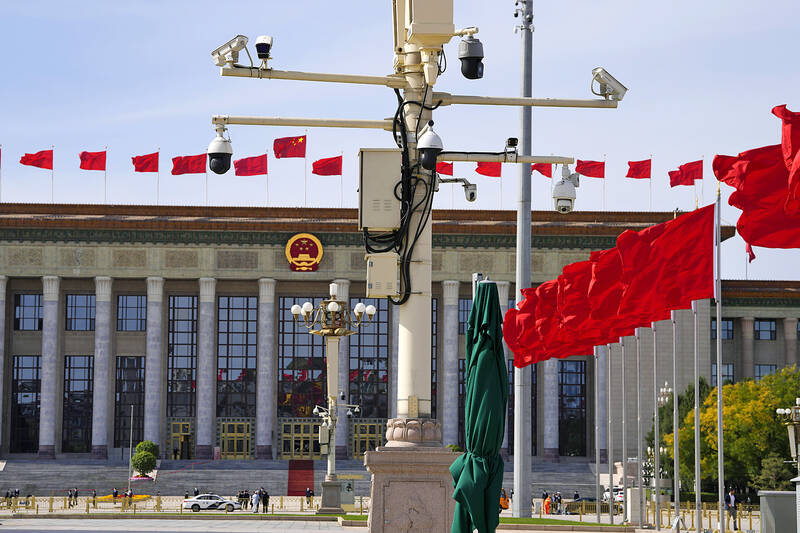China’s spy agency yesterday said it detained the head of a foreign consultancy for spying for the British Secret Intelligence Service, commonly known as MI6.
The Chinese Ministry of State Security said in a WeChat post that MI6 had since 2015 been cooperating with a foreign national with the surname Huang (黃) to establish an “intelligence cooperation relationship.”
Huang, who headed a foreign consulting agency, “entered China several times under instructions to use their public profile as a cover to collect China-related intelligence for Britain ... and seek other personnel whom MI6 could turn,” it said.

Photo: AP
Huang, who is a citizen of a third nation, allegedly passed 17 pieces of intelligence, including confidential state secrets, to MI6 before he was identified, it said.
The ministry also claimed he had received “professional intelligence training” in the UK, and had used “specialist spying equipment” to send communications.
An investigation had “promptly discovered criminal evidence that Huang was engaged in espionage activities, and took criminal coercive measures in accordance with the law,” it said.
The statement did not provide further details of Huang’s identity or employer, or describe their current condition or whereabouts.
The British government has yet to comment on the allegations, but they follow a deterioration of relations between the sides sparked in part by British opposition to Chinese investments in the UK, especially in the power and communications industries where the Chinese Communist Party exercises strong influence.
The Chinese Ministry of Foreign Affairs declined to provide further comment when asked about the case at a regular news briefing.
China and the UK have traded barbs in the past few months over allegations of perceived espionage and its resulting effect on national security.
London has warned that Chinese spies are increasingly targeting officials, allegations that Beijing has denied.
A researcher at the British parliament was arrested last year under the Official Secrets Act and subsequently denied spying for Beijing.
China, which has a broad definition of state secrets, has publicized several other alleged spying cases in the past few months.
In May last year, authorities sentenced 78-year-old American John Shing-wan Leung (梁成運) to life in prison for espionage, although Beijing has not provided substantial details of his case.
In October last year, the Chinese Ministry of State Security published the story of another alleged spy, surnamed Hou (侯), who was accused of sending several secret and classified documents to the US.
China last year also raided a string of big-name consulting, research and due diligence firms.

Conflict with Taiwan could leave China with “massive economic disruption, catastrophic military losses, significant social unrest, and devastating sanctions,” a US think tank said in a report released on Monday. The German Marshall Fund released a report titled If China Attacks Taiwan: The Consequences for China of “Minor Conflict” and “Major War” Scenarios. The report details the “massive” economic, military, social and international costs to China in the event of a minor conflict or major war with Taiwan, estimating that the Chinese People’s Liberation Army (PLA) could sustain losses of more than half of its active-duty ground forces, including 100,000 troops. Understanding Chinese

The Ministry of Foreign Affairs (MOFA) yesterday said it is closely monitoring developments in Venezuela, and would continue to cooperate with democratic allies and work together for regional and global security, stability, and prosperity. The remarks came after the US on Saturday launched a series of airstrikes in Venezuela and kidnapped Venezuelan President Nicolas Maduro, who was later flown to New York along with his wife. The pair face US charges related to drug trafficking and alleged cooperation with gangs designated as terrorist organizations. Maduro has denied the allegations. The ministry said that it is closely monitoring the political and economic situation

UNRELENTING: China attempted cyberattacks on Taiwan’s critical infrastructure 2.63 million times per day last year, up from 1.23 million in 2023, the NSB said China’s cyberarmy has long engaged in cyberattacks against Taiwan’s critical infrastructure, employing diverse and evolving tactics, the National Security Bureau (NSB) said yesterday, adding that cyberattacks on critical energy infrastructure last year increased 10-fold compared with the previous year. The NSB yesterday released a report titled Analysis on China’s Cyber Threats to Taiwan’s Critical Infrastructure in 2025, outlining the number of cyberattacks, major tactics and hacker groups. Taiwan’s national intelligence community identified a large number of cybersecurity incidents last year, the bureau said in a statement. China’s cyberarmy last year launched an average of 2.63 million intrusion attempts per day targeting Taiwan’s critical

AGING: As of last month, people aged 65 or older accounted for 20.06 percent of the total population and the number of couples who got married fell by 18,685 from 2024 Taiwan has surpassed South Korea as the country least willing to have children, with an annual crude birthrate of 4.62 per 1,000 people, Ministry of the Interior data showed yesterday. The nation was previously ranked the second-lowest country in terms of total fertility rate, or the average number of children a woman has in her lifetime. However, South Korea’s fertility rate began to recover from 2023, with total fertility rate rising from 0.72 and estimated to reach 0.82 to 0.85 by last year, and the crude birthrate projected at 6.7 per 1,000 people. Japan’s crude birthrate was projected to fall below six,